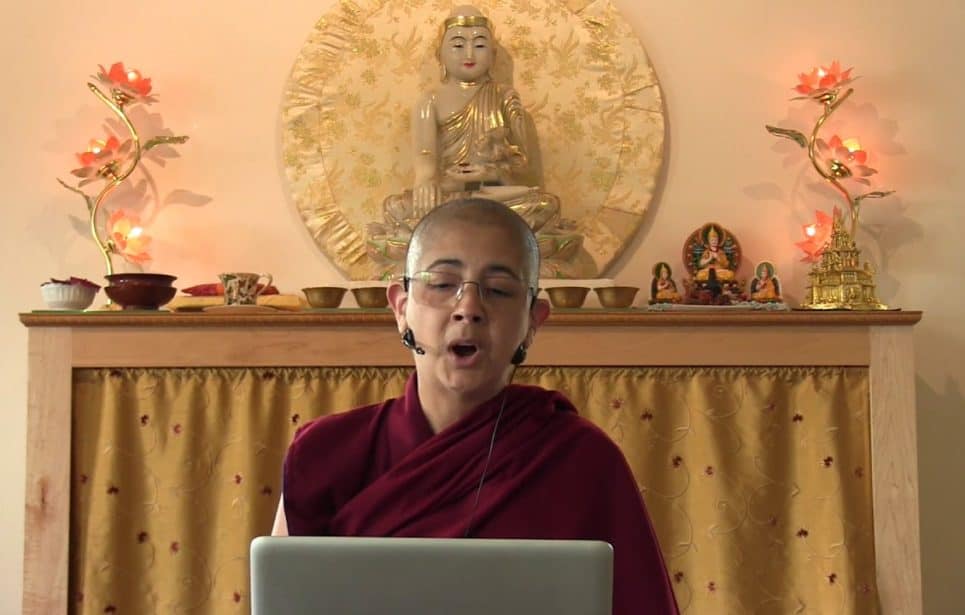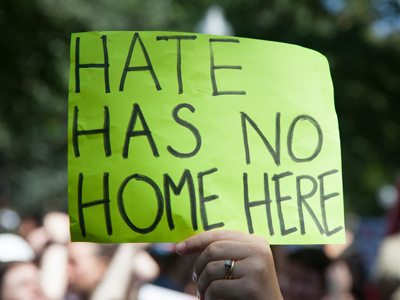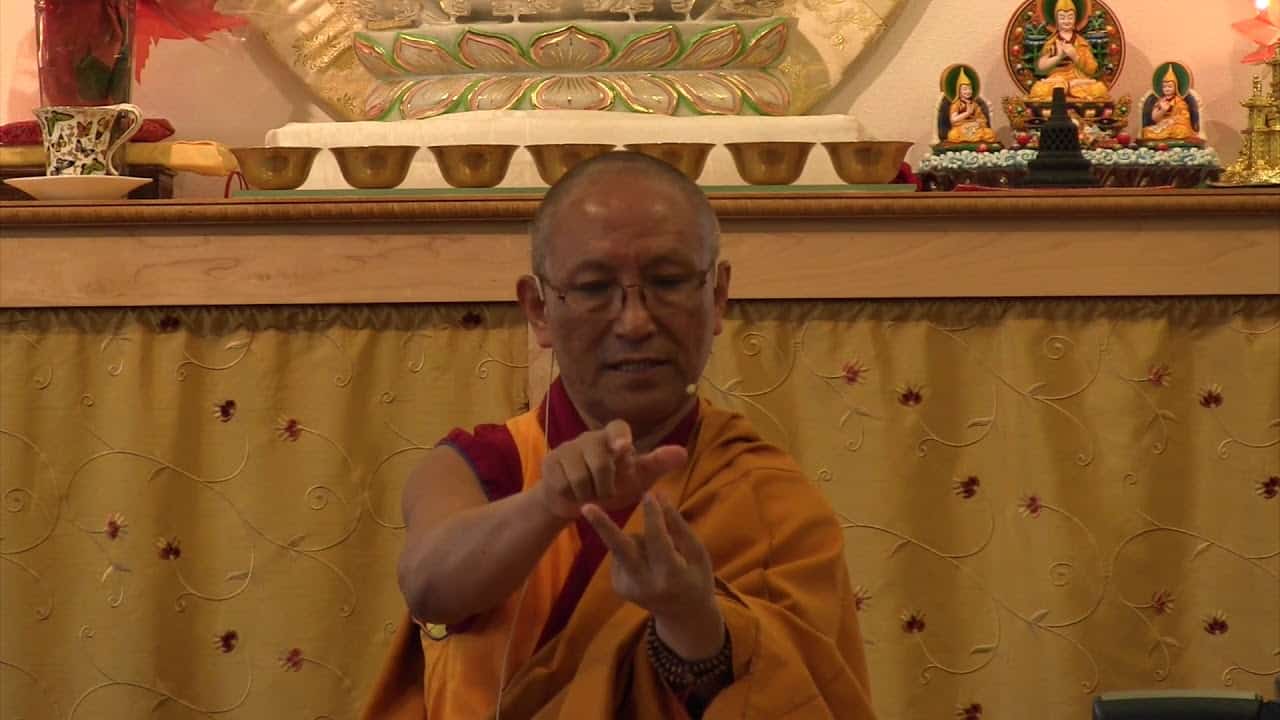Overcoming anger towards those who use hate speech
Overcoming anger towards those who use hate speech

In a September 13, 2017, Bodhisattva’s Breakfast Corner talk, Venerable Nyima refutes the hate speech she has heard over the years by examining the Buddha’s response to this kind of divisiveness.
The belief that one group of people is superior to another is not a recent phenomenon. In fact, human history is marked by violent conflicts arising from the idea that one civilization, culture, religion or race is superior and therefore has the right to conquer, destroy, convert or subjugate those deemed inferior.
At the time of the Buddha, there were five major castes in India. This is the case even today. The highest caste were the priests or Brahmans, followed by the Kshatriyas (rulers, warriors and administrators), the Vaishyas (artisans and merchants), the Shudras (laborers) and at the very bottom the untouchables, or Dalits. The Brahmans placed their caste at the top of the caste system and believed they were superior to all others. They were dismayed at the Buddha’s assertions of equality between the castes and at the fact that the Buddha allowed members of all castes to become monastics.
In the Assalayana Sutta (MN 93) as translated by Thanissaro Bhikkhu, a group of 500 Brahmans selected a well-learned young Brahman scholar named Assalayana to debate the Buddha on his assertion that all castes could attain purification, live the holy life, and become exalted in wisdom and virtue. The young Brahman addressed the Buddha as follows:
Master Gotama, the Brahmans say, “Brahmans are the superior caste; any other caste is inferior. Only Brahmans are the fair caste; any other caste is dark. Only Brahmans are pure, not non-Brahmans. Only Brahmans are the sons and offspring of Brahma: born of his mouth, born of Brahma, created by Brahma, heirs of Brahma.” What does Master Gotama have to say with regard to that?
The Buddha remained unperturbed, and responded to Assalayana, not with defensiveness or hostility, but with probing questions, testing the logic behind the theory of Brahmans’ superiority.
Through his line of questioning, the Buddha established the equality of Brahmans and the other castes on the basis of:
- Birth: because undeniably, all humans are born from a mother’s womb
- Gross Impermanence: the Buddha mentioned other countries in which masters can become slaves and slaves can become masters, pointing to the uncertainty inherent in our human condition
- Cause and effect: arguing that, regardless of caste, all humans who behave ethically attain happy results while all those who behave unethically attain unhappy results
- Potential for kindness: positing that all human beings are capable of developing a mind of loving-kindness.
- Capacity for purification: indicating that just as the Brahmans cleanse their bodies of dirt, all non-Brahmans are equally capable of going to the river to bathe and clean themselves of dirt
- Work products: because there is no difference between a fire made by Brahmans and a fire made by a non-Brahmans.
The Buddha continued deconstructing the Brahman’s assertions of superiority through a series of questions leading Assalayana to conclude that being virtuous and having a good character trump scriptural learning and birthright, as the marks of a respectable person–completely debunking the idea of a superior caste.
But the Buddha did not stop there. He told Assalayana a story about seven Brahman seers who held the view that their caste was superior to all others. These Brahman seers became enraged at a non-Brahman seer called Devala the Dark. The Brahman seers cursed Devala with hateful words but the more they cursed him the more beautiful Devala became. The Sutta reads:
But the more they cursed him, the more beautiful, good-looking, and inspiring he became. Then the thought occurred to the seven brahman seers, “Our asceticism is in vain! Our holy-life is fruitless! For before, whenever we cursed anyone, ‘Be ashes, dribble-spit!’ he would always become ashes. But the more we curse this one, the more beautiful, good-looking, and inspiring he becomes!”
Then Devala says to the Brahman Seers:
Masters, your asceticism is not in vain, and your holy-life not fruitless. Please, masters, abandon your hatred toward me.
I have heard that this evil viewpoint has arisen in the seven Brahman seers as they are consulting together in leaf huts in the wilderness: “Brahmans are the superior caste; any other caste is inferior… Only Brahmans are the sons and offspring of Brahma: born of his mouth, born of Brahma, created by Brahma, heirs of Brahma.”
To help them detach from such wrong views and subdue their hate, Devala questions the seven Brahmans about their ancestry as follows:
But do you know, masters, if the mother who bore you went only with a Brahman, and not with a non-Brahman?
And do you know if the mothers of the mother who bore you—back seven generations of mothers—went only with Brahmans, and not with non-Brahmans?
And do you know if the father who sired you went only with a Brahman woman, and not with a non-Brahman woman?
And do you know if the fathers of the father who bore you—back seven generations of fathers—went only with Brahman women, and not with non-Brahman women?
The Brahman seers answered “no” to all of these questions and concluded they could not be certain of their ancestry. Therefore they really didn’t know who they were.
By the time the Buddha finished presenting all of these lines of reasoning, Assalayana no longer held the view of the superiority of the Brahman caste and took refuge in the Buddha and his teachings.
The Buddha said:
In this world
Hate never yet dispelled hate
Only love dispels hate
This is the law
Ancient and inexhaustible
You too shall pass away
Knowing this, how can you quarrel?
——- Buddha Shakyamuni

We do not support any action that denies our human capacity for compassion and the basic right of all beings to be happy and free of suffering. (Photo © JP Photography / stock.adobe.com)
As Buddhists we believe all beings without exception wish only to be happy and not suffer. We maintain all beings have a potential to attain full awakening by eliminating all negativities and fully developing all good qualities. Because we hold this as a core belief within our Buddhist faith, we do not support any action that denies our human capacity for compassion and the basic right of all beings to be happy and free of suffering.
The Buddha taught that afflicted states of mind such as anger and hate are vanquished only by positive states of mind, such as compassion and love. In Buddhism, compassion is defined as the wish for all beings, including ourselves, to be free of suffering. Love is the wish for all beings to experience lasting happiness.
Engaging in actions that are non-harmful and cultivating respect and empathy for others are practices conducive to generating love and compassion in our minds. In contrast, harmful behavior driven by hate and resentment can only lead to suffering, violence and destruction.
As Dharma practitioners we hold those filled with hatred and confusion with compassion, seeing their suffering and wishing them to be free of it. At the same time our compassion stands firmly and courageously in opposition to the hateful ideologies and wrong views that poison the mind and heart and endanger the freedom and safety of our country. As citizens of the world, we can support all those who envision a world free of divisiveness and hatred and join them in working ethically and compassionately to bring that vision to reality.
Venerable Nyima: As reference material for this BBC, I reviewed translations of the Assalayana Sutta by Bhikku Thanissaro, Bhikkhu Bodhi and Bhikku Ňanamoli and an article published in Tricycle titled “The Buddha Talks to a Brahmin Supremacist” by Krishnan Venkatesh. Venerable Thubten Semkye and Venerable Tenzin Tsepal contributed to this article.
See Venerable Nyima present this Bodhisattva’s Breakfast Corner talk on YouTube here.
Venerable Thubten Nyima
Ven. Thubten Nyima was born in Colombia and has lived in the United States for over 35 years. She became interested in Buddhism in 2001 after meeting a tour of monks from the Ganden Shartse Monastery. In 2009 she took refuge with Ven. Chodron and became a regular participant in the Exploring Monastic Life retreat. Ven. Nyima moved to the Abbey from California, in April of 2016, and took Anagarika precepts shortly thereafter. She received sramanerika and shiksamana ordination in March 2017. Ven. Nyima has a B.S. degree in Business Administration/Marketing from California State University, Sacramento and a Masters degree in Health Administration from the University of Southern California. Her career spans both private and public sectors, including 14 years of management-level work for Sacramento County’s Child Protective Services. She has a young adult daughter who lives in California. Ven. Nyima contributes to Sravasti Abbey’s administrative functions by thanking donors, helping with community planning meetings and facilitating SAFE courses. She also works on the vegetable garden and enjoys working in the forest when needed.


